 Petzlover
Petzlover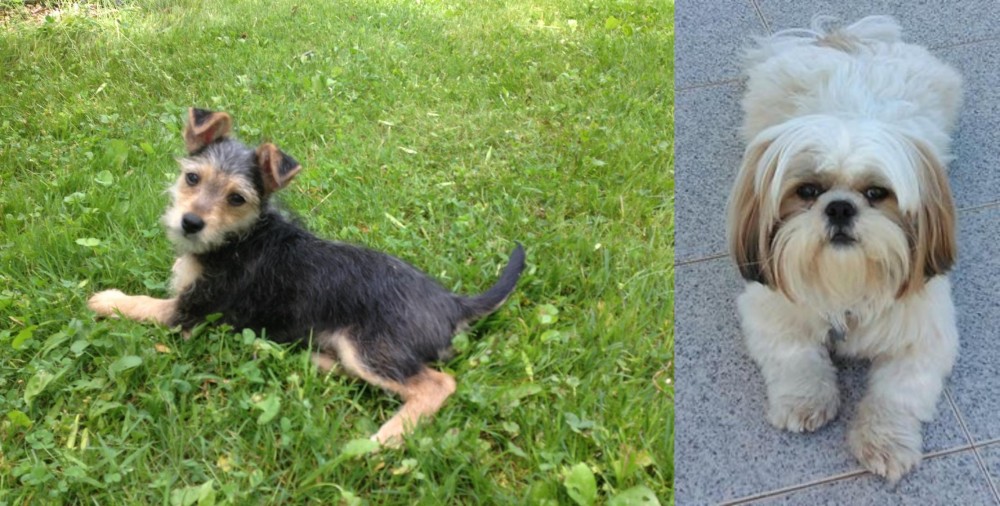 Schnorkie is originated from United States but Shih Tzu is originated from China. Both Schnorkie and Shih Tzu are having almost same height. Both Schnorkie and Shih Tzu are having almost same weight. Schnorkie may live 3 years less than Shih Tzu. Both Schnorkie and Shih Tzu has almost same litter size. Schnorkie requires Moderate Maintenance. But Shih Tzu requires High Maintenance
Schnorkie is originated from United States but Shih Tzu is originated from China. Both Schnorkie and Shih Tzu are having almost same height. Both Schnorkie and Shih Tzu are having almost same weight. Schnorkie may live 3 years less than Shih Tzu. Both Schnorkie and Shih Tzu has almost same litter size. Schnorkie requires Moderate Maintenance. But Shih Tzu requires High Maintenance
 This dog is a cross between the Miniature Schnauzer and the Yorkshire Terrier.
This dog is a cross between the Miniature Schnauzer and the Yorkshire Terrier.
It’s not a purebred dog and is known as a designer dog. These dogs inherit characteristics from both of its purebred parents.
The origins and history of these breeds is often unknown with their being no records as to when or where breeders started developing them. This particular mixed breed dog originated in the United States.
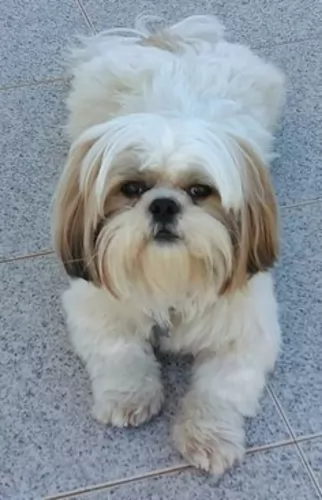 The Shih Tzu is an Imperial Chinese breed developed by palace breeders hundreds of years ago with breed stock from the Tibetan lines. It is quite probable that the Shih Tzu was originally a cross between two Sino-Tibetan ancient dogs – the Pekingese and the Lhasa Apso. Based on their looks, the Shih Tzu means the lion dog, but they were really very pampered palace dogs living with the Chinese emperors and families. The emperors were always gifting the breeders who developed the most affectionate, gentle and beautiful Shih Tzus.
The Shih Tzu is an Imperial Chinese breed developed by palace breeders hundreds of years ago with breed stock from the Tibetan lines. It is quite probable that the Shih Tzu was originally a cross between two Sino-Tibetan ancient dogs – the Pekingese and the Lhasa Apso. Based on their looks, the Shih Tzu means the lion dog, but they were really very pampered palace dogs living with the Chinese emperors and families. The emperors were always gifting the breeders who developed the most affectionate, gentle and beautiful Shih Tzus.
Until the 1930’s the Shih Tzu was not known to the world outside the emperor’s palace. Once the breed did come out from behind the palace walls, they were immediately popular. Much debate went on about how to refine the breed as clubs began to spring up in Peking and then in England. It was not until 1969 the Shih Tzu was recognized and entered in the AKC Stud Book.
While the original Shih Tzu might have been a mix between the Pekingese and the Lhasa Apso, today’s breed spread around the world after the second world war. In Europe in the 1930’s the breed was classified as Apsos. In 1935 the first Shih Tzu Club of Europe was formed, and the first standard was written, and the breed was categorized as the Shih Tzu.
Following World War II, soldiers brought the dogs to the States from Europe. By the 1950’s the breed was growing in popularity and the AKC recognized the breed in 1969 as members of the Toy Group. They are now recognized by all major kennel clubs throughout the western world. They are recognized by the Federation Cynoloqique Internationale in the Companion and Toy Group, among Tibetan breeds.
The Shih Tzu is a good watchdog, but it was bred to be a companion animal. It is a friendly, open breed that welcomes strangers. They are great with other animals and children as well as adults.
 The Schnorkie is a small dog standing at between 12 to 30cm in height and weighing just 3 to 6kg.
The Schnorkie is a small dog standing at between 12 to 30cm in height and weighing just 3 to 6kg.
Schnorkies have an athletic build but they are lean and you want to keep them that way.
Their double coat is mostly silky and straight, but can be wavy too. The double coat can be grey, silver, fawnish and have a mix of colors while also being available in solid colors.
The ears are half erect, half floppy and the tail tends to be medium length, plumed and held up.
Schnorkies are high spirited little dogs and they can also prove to stubborn. There is nothing that a bit of training and socialization won't do for stubborn dogs, making them obedient and responsive to their owners.
Because they are hybrid dogs, they can inherit temperaments or looks from either of the parent dogs.
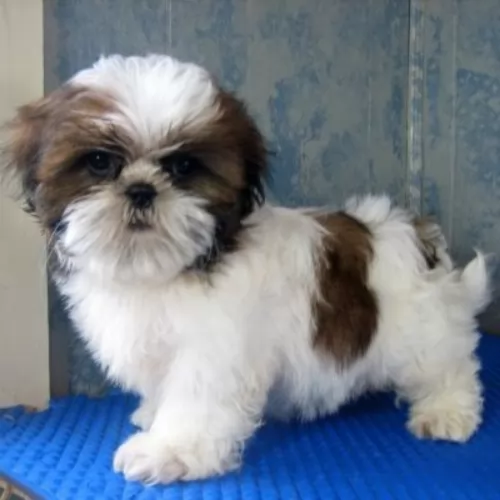 This is a breed of lively, sturdy and alert little dogs with a beautiful double coat that is flowing and long. In its full glory the Shih Tzu coat is touching the floor all the way around the dog. The dog’s bearing is as royal as its history, arrogantly carrying his head high and his tail curving over his back.
This is a breed of lively, sturdy and alert little dogs with a beautiful double coat that is flowing and long. In its full glory the Shih Tzu coat is touching the floor all the way around the dog. The dog’s bearing is as royal as its history, arrogantly carrying his head high and his tail curving over his back.
The Shih Tzu is a solid, compact breed with weight and substance. They may be a small dog, but they are a strong one. They have large dark eyes with a short muzzle and fur covered drop ears. They are just a little longer than they are tall with a distinct underbite.
There are a few differences between the European or UK Kennel Club standard and the American Kennel Club AKC standard. As opposed to the UK standard the AKC standard states that:
• The hindquarters are muscular while the front are straight. They are balanced in that they are not too long or too short.
 Your Schnorkie is a jaunty little dog who is going to love playing games with you. Children will need to treat him with gentleness and respect simply because he is small.
Your Schnorkie is a jaunty little dog who is going to love playing games with you. Children will need to treat him with gentleness and respect simply because he is small.
He is social, friendly and loving with his human family, though sometimes, coming from the Schnauzer, he gets a bit moody.
He makes a great family pet though and and while he loves to be outside playing, he also loves to come indoors and be everybody’s lap dog for the evening.
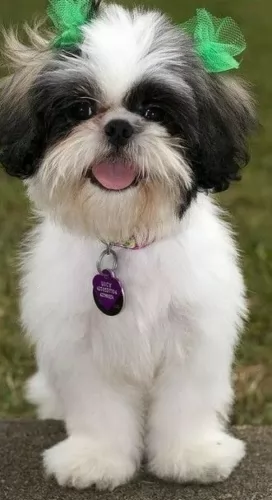 2.Special talents – they were bred to be companion animals. They are friendly and loyal.
2.Special talents – they were bred to be companion animals. They are friendly and loyal.
3.Adaptability Yes very much so. They can live in an apartment or on a farm. It doesn’t matter and they don’t need a yard.
 Your Schnorkie, as a hybrid breed, can inherit some health problems from either parent – the Schnauzer or the Yorkshire Terrier.
Your Schnorkie, as a hybrid breed, can inherit some health problems from either parent – the Schnauzer or the Yorkshire Terrier.
Then again, mixing pure bred dogs can eliminate some common dog ailments. Overall, the Schnorkie is a healthy dog and can live up to 15 years of age.
A couple of major health concerns with the Schnorkie are dental problems and pancreatitis.
If your dog has tooth problems he might be in terrible pain and that is why it is so important to look inside his mouth.
Dogs can break their teeth and they can also get gum disease. Dogs have a more alkaline mouth and this is what encourages plaque. Try and brush your pet’s teeth with special canine toothpaste and toothbrush because dental disease can cause lots of problems for your pet.
The pancreas helps with the digestion of food and to regulate blood sugar. Pancreatitis is more common in Schnauzers, and then the pancreas is swollen and inflamed.
Dogs with this disease will lose their appetite, be lethargic, restless and have stomach pain. You may see your pet hunching his back. Pancreatitis can lead to organ damage and you will need to get your dog to the vet.
 For many breeds that have the advantage of isolation like the Shih Tzu did with the emperors of China usually have very little genetic health issues. Most of the breed is indeed healthy but there are some issues.
For many breeds that have the advantage of isolation like the Shih Tzu did with the emperors of China usually have very little genetic health issues. Most of the breed is indeed healthy but there are some issues.
• Brachycephalic airway obstructive syndrome due to the shape of their face and head causes them to have breathing issues. They cannot handle heat and they cannot swim. They can have an upper airway obstruction that makes it hard for them to breath. If this is bad enough, surgery may be required.
• Hypothyroidism – thyroid does not produce the hormones necessary for metabolism to work effectively. This can lead to weight gain, hair loss, lethargy and muscle loss. It can be treated effectively.
• Issues of the eyes include – cataracts, corneal dryness and inflammation, progressive retinal atrophy, improperly closing eyelids and retinal detachment.
 Puppies will need 4 small meals a day, but by 8 weeks your Schnorkie will be ready to move onto dry dog food. As he grows into an adult you will cut the meals down to two a day.
Puppies will need 4 small meals a day, but by 8 weeks your Schnorkie will be ready to move onto dry dog food. As he grows into an adult you will cut the meals down to two a day.
The best commercially manufactured dry dog food is able to meet your dogs nutritional needs and it’s super convenient too. It can be a good idea to feed your pet some home-made food too. Twice a week will be sufficient to add in this home-made food - boiled chicken, brown rice or pasta, sweet potatoes, carrots and spinach will be excellent for him and his digestion and be a tasty treat for him. You can simply chop it up and add it to the dry kibble. Some raw meat occasionally can help to ward off nasty skin ailments. Make sure that your Schnorkie has a constant supply of cool fresh water.
Schnauzers and Yorkies both have high maintenance coats and your Schnorkie will also require regular brushing, though he doesn’t shed much. Some people prefer to hand their dogs in and have them professionally groomed.
Just because a Schnorkie is a little dog, doesn’t mean he doesn’t need exercise. You don’t want a small dog like this getting obese and unfit. Take him for walks and give him some ball games.
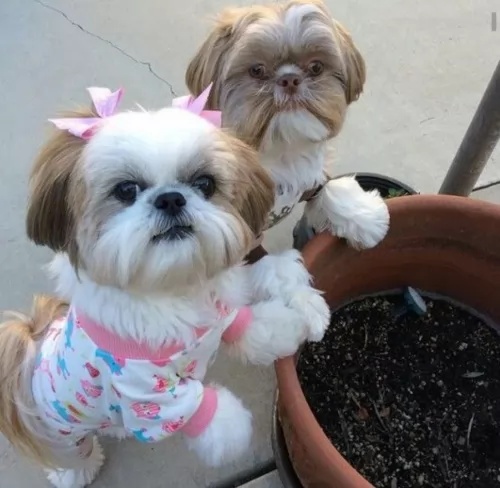 1.Feeding the puppy – this is a toy dog so don’t overfeed. They have a tendency to become obese. Calorie and weight level need to be calculated with any diet you feed. The diet should be high quality with plenty of protein made for toy dogs. Feed the puppy at least 3 times a day, maybe four in very small amounts, never more than ½ cup per day.
1.Feeding the puppy – this is a toy dog so don’t overfeed. They have a tendency to become obese. Calorie and weight level need to be calculated with any diet you feed. The diet should be high quality with plenty of protein made for toy dogs. Feed the puppy at least 3 times a day, maybe four in very small amounts, never more than ½ cup per day.
2.Feeding the adult - this is a toy dog so don’t overfeed. They have a tendency to become obese. Calorie and weight level need to be calculated with any diet you feed. The diet should be high quality with plenty of protein made for toy dogs. Feed the adult once or twice a day in larger amounts than the puppy but never more than ¾ of a cup per day.
3.Points for Good Health - most Shih Tzu’s are hardy with exceptionally good health.
This is a pampered, not high energy dog. However, she still needs playtime, which can be indoors and short walks outdoors every day.